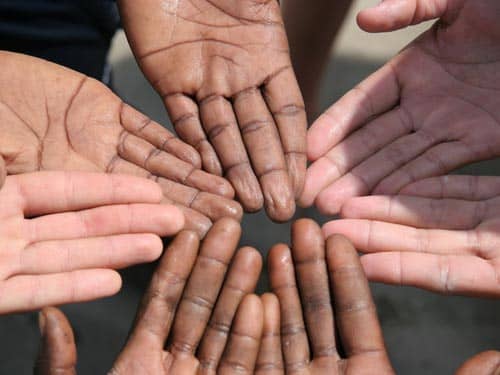I grew up in the Holiness Church, where prayer was an event. On Sunday mornings, for as far back as I can remember, I watched one minister or another lead prayer. He always started out slowly, standing erect, his eyes closed and head bowed. Gradually the tempo changed. The pastor would take off his glasses and reach for the handkerchief in his pocket. Just about then, the organist would begin to play deep chords to accent certain words. This prompted the human chorus of humming, clapping, stomping, and sometimes moaning.
The pastor would start to sweat as the cadence of his speech changed. He was sort of singing, sort of talking. The organist kept pace with more chords, now accompanied by drums and an occasional tambourine. Soon most of the people in the church were on their feet, talking back to the pastor, helping him out with "Amens" and "Glory Fathers," being driven to a feverish pitch by the "Thank-Yous" and "Hallelujahs" being shouted out from every corner of the sanctuary.
Prayer in the Holiness Church was an amazing, sometime frightening, event for a child to witness. The energy that was revved up from the sanctuary certainly amazed me and made a lasting impression. Although I could barely understand a world the pastor was saying over the organ and the human orchestra, I knew something powerful was taking place. Sometimes I clapped because everyone else was clapping. Other times I clapped because I was afraid not to. I was afraid that if I did not clap, if I just sat there watching, God would think I didn't love him. God would think I didn't know how to pray to him. The conclusion was still fresh in my mind. Sure, I knew all of the childhood prayers I uttered on my knees at the side of my bed. Many years of Sunday-school attendance had etched certain Psalms and rote prayers into the fibers of my brain. However, somewhere deep inside of me, I had the secret belief that I did not know how to pray, and that frightened me.
I'm not sure where I heard it or why I believed it, but when I was in my mid-twenties a few words changed my approach to and experience of prayer. The words were these: "Every thought you think is a prayer. Every word you speak is a prayer. Every act in which you engage is a prayer, because the Spirit of God lives in you." Now, how awesome is that? I didn't need drums. I didn't need to clap. I didn't need a host of other people to help me raise the volume of my prayers so that God would hear them.
If the words of that statement are true, and I do believe they are, it means that at every moment of every day, I am communicating with the Creator of the universe. While this is not the prayer of the Holiness Church, I still find prayer to be both amazing and frightening. It is amazing because it means that God knows me from the inside out. It is frightening because some of my thoughts, words, and actions are not things I would want to lay in God's lap for sanctioning. I realize that if God were, in fact, to put the power of his/her presence on some of the things that have been in my mind, I would be a hazard to myself. Thank God for divine wisdom, and thank God for grace.
Scripture tells us to "Pray without ceasing," to honor God in all of our ways so that s/he can direct our paths. In essence I have learned that I must talk to God, commune with God, stay conscious of God's presence within me at all times. It is through this understanding and desire that I have grown to love prayer.
I sometimes jokingly say that I pray about everything, including what to wear and what to eat. In some ways the joke is very true. My thoughts are consistently focused on what I believe will bring honor to the presence of the divine within me. At times I have long conversations with God. Sometimes I ask questions. I admit that there are also times when I let out my frustrations, fears, and anxieties in less than honorable ways. No matter what I pray about or how I pray about it, the result I always get is comfort. I find peace through prayer. Most important of all, I believe that I strengthen my connection to the almighty presence....
Over the years, I have received hundreds of letters from people who believe, as I once did, that they do not know how to pray. They are seeking a formula. They are afraid not to pray and even more afraid not to pray right. Remember: every thought, every word, every action is a prayer. If we can remain mindful of that, focusing our attention on honoring God's presence in everything and everyone, prayer will become as natural as breathing. If we can surrender, give up the need to do it right, by focusing on just doing it earnestly, honestly, and with faith, our thoughts and words will be filled with God's radiant essence. When we slip, when we forget to be honorable or faithful, grace steps in. She translates the words to find the deeper meaning. Along with her sisters faith and hope, grace shapes our thoughts and words so that we get exactly what we need, a response to our prayer that will help us grow inwardly.
Be Blessed!

